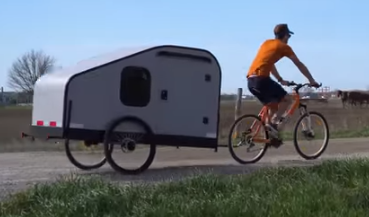It doesn’t get any cheaper or more simple than employer-provided housing. If you have kids or a partner who is tied to his or her job, this isn’t going to be an option, but if you’re single, or your partner wants to team up with you on the job, then one of these jobs may be the answer to your housing woes until you can save up to have something more permanent.
 1. Migrant Farmhand
1. Migrant Farmhand
Large farms that employee migrant workers typically have dormitories or housing of some sort for their workers and your housing expenses are part of your pay package.
For something that lasts longer than the strawberry harvest, consider work as a ranch hand at a cattle ranch or, if you are a good rider, you might consider working as a tour guide, riding instructor, or horse handler at a dude ranch.
There are also numerous smaller farms (especially organic and experimental) and various types of communes around the country that will provide housing and/or meals in exchange for an unpaid apprenticeship (ATTRA Internships), so if you are interested in learning how to grow your own food, build your own buildings, and/or live off-grid, you can kill two birds with one stone by learning what you need while someone else feeds and shelters you for a season (or maybe even a full year).

2. Seasonal Resort Staff
Resorts, especially seasonal ones, like beach towns and ski lodges, may offer on-site accommodations to their staff, especially if the area is notoriously unaffordable for an average person. You may be entitled to other perks, like off-hours use of their gym or pool facilities, discounted meals, etc.

3. Elder Care
If you are patient with elderly people, and especially if you have any sort of medical background, then you may be able to find a job as a live-in caretaker for an older person who needs some help with chores around the house, someone to drive them to appointments, and most especially someone to be present in case of an emergency. Depending on the amount of help the person needs, the job may be more as a companion, with most or all of the compensation coming in the form of room and board (meaning you would still need to have an outside job to pay your own personal bills). Think of it as living with a grandparent and keeping them from being lonely. On the other end of the scale, you may be providing aide care in the way of helping with bathing and dressing, transferring the person into a wheelchair, doing all the chores and errands, etc. Essentially, you’re caring for the person in their own home so they don’t have to go to a nursing home. This level of care can be expected to come with a salary, as well as room and board, since it would be your full-time job.
In addition to this sort of private-duty caregiving, there are assisted living and retirement communities which may offer included or reduced-price housing if you live in their facility and are on-call (namely at night) to assist any residents.
 4. School Staff
4. School Staff
Boarding schools and colleges may offer on-campus housing to staff as part of the compensation package, or at a reduced rate. Typically, teachers are going to get first-dibs on the housing, but some places may have housing for the heads of some departments, like groundskeeping. If you’re willing to be a dorm parent in addition to your regular duties on campus, then you’re much more likely to get an apartment. (I went to a day/boarding school and teachers who lived on campus typically served in this dual role, although the librarian and some of the administrators also had an apartment or house on campus.)
 5. Cruise Ships
5. Cruise Ships
If you’re not easily prone to motion sickness, consider a stint on a cruise ship. You’re going to have terrible accommodations compared to the paying guests, of course, but a top bunk in a double-occupancy closet next to the engine is still better than a leaky cardboard box on a street anywhere. (Inside Cruise Ship Crew Cabins) And you only have to be in your room to sleep. When you’re not working, you can be up on deck and may be entitled to use some of the amenities during off-peak hours. Plus you can disembark when you are off the clock and can enjoy the same beaches and other experiences that the paying guests do as well.
Related ocean-going industries include fishing and shipping. Fishing is a much more dangerous job and, depending on your location, it may be difficult to get a job in the fishing industry, but it may pay better. Cargo shipping should be less dangerous, but it would definitely have fewer creature comforts than a cruise ship. But cargo shipping is much more widespread, as barges constantly run up and down the major rivers in the interior of the U.S.
 6. Teaching Internationally
6. Teaching Internationally
If you have a Bachelor’s Degree, you are pretty well guaranteed a job teaching English in China, Japan, Korea, and a few other places. (If you want to teach in Europe, you’re going to need a teaching certificate of some sort, the same as if you wanted to teach in the U.S. or Canada.) The demand for native English speakers is so high in some places that they may consider people without a degree if you have experience teaching or tutoring in some capacity, or had a job where you worked in the language a lot (like legal work). These teach-abroad programs will provide training when you arrive and either provide housing or give you an allowance and help you find your own housing. They will also typically pay for your plane ticket if you sign a one-year contract, and may also reimburse you the cost of your passport. Pay is notoriously low in these programs, although you should make enough to keep yourself fed and housed if you live simply. If you want money for souvenirs and side trips, you will likely need to do a side hustle as a tutor. Apparently it’s not hard to get students who are willing to pay for extra one-on-one time. The more experience you get as a teacher (and especially if you get a TEFL certificate), the easier it will be to get jobs at more prestigious schools and language institutions, which pay more money.
 7. Oil Industry
7. Oil Industry
Are you willing to work a hard, dirty, and dangerous job if it comes with housing and a fat paycheck? Check out the oil industry. Oil rigs provide on-site housing and money enough that you can afford somewhere to live when you come ashore. (Similar to a military deployment, rig workers go out on the rig for weeks or months at a time, then come home for a long break.) The oil companies running the pipelines in Alaska also typically provide company housing (sometimes they provide an entire company town). Years ago, a coworker of mine had a friend who worked on one of the Alaskan pipelines. She would work about 3 weeks straight, then have a full week off. She made so much money in that 3 weeks of work, and had no expenses, as her room and board was provided, she was able to afford to fly south and spend her week off visiting family and friends in the Lower-48.
 8. Long Haul Trucking
8. Long Haul Trucking
If you can cobble the money together for driving school, why not get your commercial driving license (CDL) and do long-haul trucking? Not only does long-haul trucking pay more than any other form of trucking (as of the time of writing, you can make approximately $100,000 per year), but it comes with housing. Most long-haul trucks these days have a sleeper cab that functions similarly to a small camper, giving you a bed, microwave, mini fridge and maybe even a chemical potty. Absent a sleeper cab, you should get a per diem allowance from your company to pay for a motel while you’re on the road. Long-haul truckers don’t ever have to come off the road, but if you want to schedule some time to be stationary and to visit family and friends (loneliness and social isolation is a drawback to this lifestyle long-term), you will be making more than enough money to afford to stay in a short-term stay suite while you’re in town.
Of all the jobs on this list, this is the one that works best for couples because they can team drive. You will have to make time for days off, though, to make sure you spend adequate time together, or you’ll be stuck with one person driving while the other sleeps with no time to really interact in between.
This is also one of the few jobs on the list that is generally pet-friendly. Some long-haul truckers have a dog (and, on rare occasions, a cat) to keep them company. If you have your own truck or are in a rent-to-own/owner-operator deal, this is not an issue, but if you’re working as an employee of a trucking company, they may or may not allow pets (although I have seen several companies advertising a pet-friendly policy as a perk, so this is becoming a more commonplace option).
 9. Nanny
9. Nanny
If you love kids, and especially if you have education or training in early childhood development or teaching, then you may be able to find a job as a live-in nanny. This will be a much harder industry to get into than the others mentioned here, as the sort of people who can afford to hire a nanny and have a spare room where she can live are going to be very selective. In Europe, in particular, there’s training–like a sort of trade school–for au pairs, and to get the sort of job that comes with room and board, you will generally be expected to have had this sort of formal training. However, standards may be lower if the job is short-term to fill in while the regular nanny is on extended leave or the family is between nannies.
 10. Camp Counselor
10. Camp Counselor
If you just need a place to live for a couple of months in the summer, and you don’t mind working with children, then working as a camp counselor might be up your alley. Counselors typically sleep in the cabin or bunkhouse with the children (although they sometimes get a private room in the cabin) and eat meals with them as well. In addition to your room and board, you can expect some salary, which, if you save all of it, might be enough to get you set up in a new house or apartment when the camp shuts down in August.
 11. State or National Park Staff
11. State or National Park Staff
In a closely-related niche as a camp counselor are park rangers and other park staff. If you love the great outdoors and love the idea of caring for it and helping others enjoy it, then this job is up your alley. In some places, only the park ranger will be given on-site accommodations (and you’re not going to jump into being a park ranger straight out of the gate unless you have a degree in something like wildlife or wilderness management), but in more remote parks, like many of those out West, accommodations may be provided for entry-level staff simply because, as with the pipelines in Alaska, there aren’t places for people to live anywhere near where the work needs to be done. So this is a job where you will need to be flexible about where you work, but once you’re in the system and getting experience, you have the opportunity to work up to one of those coveted park ranger positions that come with a house in a less remote area.
12. Military Service
This is a bit extreme in the search for employer-provided housing as it typically comes with a 3 year enlistment and there’s no guarantee of where you will live or what you will wind up doing or whether or not you’ll end up in a combat situation. But if you are a young person who really feels adrift in life and can’t seem to get your feet under you, then a stint in the military might be what you need to learn discipline, self-confidence, direction, and give you time enough to save up some money to get started in life. (This is to say nothing of post-enlistment perks like paid college tuition or student loan forgiveness and preferred hiring in some jobs. VA healthcare may or may not be considered a perk, depending on who you ask.)
 13. Peace Corps
13. Peace Corps
If you don’t mind the idea of travel and a work contract that lasts several years, but you’re less enthused about military discipline or fitness requirements or the prospect of going to war, then working for the Peace Corps might be a better fit.
The drawback is that you’re not going to make much money to put towards setting yourself up afterwards. A benefit, however, is that you might qualify for some student loan forgiveness after you serve (and are granted a deferment while you serve), so lightening your debt load may provide the same financial benefit as earning more money. It also looks good on a resume when you get back stateside and you are likely to have all sorts of new skills that make it easier for you to find work.
 14. Roadie or Carnie
14. Roadie or Carnie
If you have experience with sound equipment or lighting and cameras, and most especially if you like constant travel, then you may be able to get a gig as a roadie touring with a band, comic, or stage performance (think Riverdance or Cirque du Soleil). Depending on the terms, you may be living in a motorhome part of the time and in a motel room at other times.
A variation of the roadie is the carnie. Carnivals and circuses still travel around the country and they need equipment operators and staff, not just performers. Expect accommodations to be some sort of camper while you’re on the road for the season. (When it’s off-season, you will likely be on your own, although some outfits have a winter location where land might be available for your use if you provide your own housing.)
My late husband jousted professionally for a year and worked with a company that toured renaissance festivals through the spring, summer, and fall. Most ren-faires last only about a month in one location and vendors, performers, and staff often go from one festival to another, as he did. But be prepared: housing might consist of a tent rather than a camper. (Although medieval tents are far superior to modern ones.)
Are you interested in the nomadic life, but don’t need an employer-provided job? Check out this post for more nomad options: On the Road Again – Exploring Nomadic Housing Options



